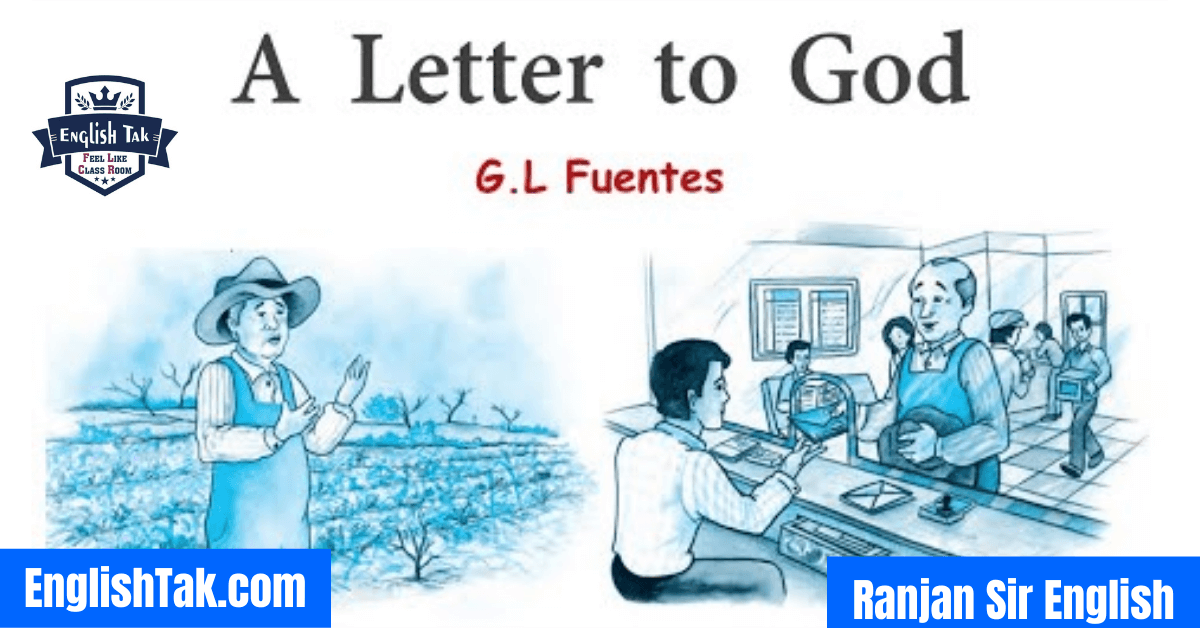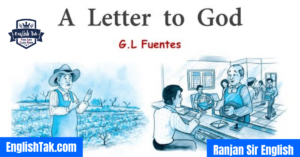![]()
A letter to God – Summary, Poetic Device & Questions Answer
A Letter To God
By GL Fuentes
Click on the Below Link to Reach Directly
Full Chapter | Summary | Chapter Sketch | About the Characters | Chapter Highlights | Word Meanings | Questions and Answers | NCERT Solutions | Extract Based Questions | Short Questions and Answers | Long Questions and Answers
Click Here to Download in Pdf Format
The house – the only in the entire valley – sat on the crest of a low hill. A letter to God – Summary Poetic Device & Questions AnswerFrom this height one could see the river and the field of ripe corn dotted with the flowers that always promised a good harvest. The only thing that earth needed was a downpour or at least a shower. Throughout the morning Lencho – who knew his fields intimately – had done nothing else but see the sky towards the north-east.
“Now we’re really going to get some water, woman.”
The woman who was preparing supper, replied, “Yes, God willing”. The older boys were working in the field, while the smaller ones were playing near the house until the woman called to them all, “Come for dinner”. It was during the meal that, just as Lencho had predicted, big drops of rain began to fall. In the north-east huge mountains of clouds could be seen approaching. The air was fresh and sweet. The man went out for no other reason than to have the pleasure of feeling the rain on his body, and when he returned he exclaimed, “These aren’t raindrops falling from the sky, they are new coins. The big drops are ten cent pieces and the little ones are fives.”
With a satisfied expression he regarded the field of ripe corn with its flowers, draped in a curtain of rain. But suddenly a strong wind began to blow and along with the rain very large hailstones bean to fall. These truly did resemble new silver coins. The boys, exposing themselves to the rain, ran out to collect the frozen pearls.
“It’s really getting bad now,” exclaimed the man. “I hope it passes quickly.” It did not pass quickly. For an hour the hail rained on the house, the garden, the hillside, the cornfield, on the whole valley. The field was white, as if covered with salt.
Not a leaf remained on the trees. The corn was totally destroyed. The flowers were gone from the plants. Lencho’s soul was filled with sadness. When the storm had passed, he stood in the middle of the field and said to his sons, “A plague of locusts would have left more than this. The hail has left nothing. This year we will have no corn.”
That night was a sorrowful one.
“All our work, for nothing.”
“There’s no one who can help us.”
“We’ll all go hungry this year.”
But in the hearts of all who lived in that solitary house in the middle of the valley, there was a single hope, help from God.
“Don’t be so upset, even though this seems like a total loss. Remember, no one dies of hunger.”
All through the night, Lencho thought only of his one hope: the help of God, whose eyes, as he had been instructed, see everything, even what is deep in one’s conscience. Lencho was an ox of a man, working like an animal in the fields, but still he knew how to write. The following Sunday, at daybreak, he began to write a letter which he himself would carry to town and place in the mail.
It was nothing less than a letter to God.
“God,” he wrote, “if you don’t help me, my family and I will go hungry this year. I need a hundred pesos in order to sow my field again and to live until the crop comes, because the hailstorm….”
He wrote ‘To God’ on the envelope, put the letter inside and, still troubled, went to town. At the post office, he placed a stamp on the letter and dropped it into the mailbox.
One of the employees, who was a postman and also helped at the post office, went to his boss laughing heartily and showed him the letter to God. Never in his career as a postman had he known that address. The postmaster – a fat, amiable fellow – also broke out laughing, but almost immediately he turned serious and, tapping the letter on his desk, commented, “What faith! I wish I had the faith of the man who wrote this letter. Starting up a correspondence with God!”
So, in order not to shake the writer’s faith in God, the postmaster came up with an idea: answer the letter. But when he opened it, it was evident that to answer it he needed something more than goodwill, ink and paper. But he stuck to his resolution: he asked for money from his employees, he himself gave part of his salary, and several friends of his were obliged to give something ‘for an act of charity’.
It was impossible for him to gather together the hundred pesos, so he was able to send the farmer only a little more than half. He put the money in an envelope addressed to Lencho and with it a letter containing only a single word as a signature: God.
The following Sunday Lencho came a bit earlier than usual to ask if there was a letter for him. It was the postman himself who handed the letter to him while the postmaster, experiencing the contentment of a man who has performed a good deed, looked on from his office.
Lencho showed not the slightest surprise on seeing the money; such was his confidence – but he became angry when he counted the money. God could not have made a mistake, nor could he have denied Lencho what he had requested.
Immediately, Lencho went up to the window to ask for paper and ink. On the public writing-table, he started to write, with much wrinkling of his brow, caused by the effort he had to make to express his ideas. When he finished, he went to the window to buy a stamp which he licked and then affixed to envelope with a blow of his fist. The moment the letter fell into the mailbox the postmaster went to open it. It said: “God: Of the money that I asked for, only seventy pesos reached me. Send me the rest, since I need it very much. But don’t sent it to me through the mail because the post office employees are a bunch of crooks. Lencho.”
[yarpp]
Suggested For You | |
| Grammar | EnglishTak YouTube Channel |
| Spoken English | Videos |
| Ranjan Sir Blog | Join Our WhatsApp Group |
A letter to God – Summary Poetic Device & Questions Answer
A Letter To God Summary
Lencho’s Hope of Good Harvest
Lencho was a farmer who lived on the crest (peak) of a low hill with his family. His was the only house in the entire valley. His field was full of ripe corn and easily visible from the house. He was eagerly waiting for a good rain to have a good harvest so he could earn money for his family.
Turning of Lencho’s Hope into Despair
As Lencho hoped, it started raining at the time of supper (dinner) which gave Lencho a ray of hope. He was extremely delighted to see that. He compared the raindrops with silver coins which shows his joy. But soon his joy turned into despair as the rain changed into hailstones which ruined the crops. The field had been covered with snow like a layer of white salt. Lencho was worried for his family.
Lencho’s Firm Belief in God
Though Lencho was a poor farmer and had lost all his crops, he had firm faith in God. He found in God his last hope and decided to write a letter to God for help. He asked God to send him a hundred pesos so that he could sow his field again and support his family until the new crops were harvested. He also wrote that if God didn’t help him, his family would die of hunger.
The Postmaster’s Letter to Lencho’s Letter
After reading Lencho’s letter to God, the postmaster laughed but soon realised that Lencho had firm faith in God and his belief should not be shaken. So, he decided to help Lencho with the help of his office employees. He collected seventy pesos and handed the envelope to Lencho himself in which he also contributed a part of his salary.
Lencho Addresses the Post Office Employees ‘A Bunch of Crooks’
Lencho became angry when he saw seventy pesos in the envelope as he had demanded a hundred pesos. He did not believe that God could do such a mistake and send him less money. In his letter, he requested God not to send the rest of the money through the money order because he thought that the post office employees were ‘a bunch of crooks’ who might have stolen his money.
Chapter Sketch
This story is about hard life and extreme faith in God of a poor farmer (Lencho) who had lost his crop due to heavy rain and hailstones. It was the only source of income to fulfill his family’s desires.
He firmly believed that God would help him in such a difficult situation and would not let him and his family die of hunger. He wrote a letter to God to seek help. Some kind employees of the post office helped him. So, the story tells us to have faith in God and never lose hope in adverse situations.
About the Characters
Lencho : A poor farmer who lived on the peak of a low hill with his family. He was a firm believer in God. He was innocent, hopeful, caring and responsible.
Postmaster : A fat, amiable (friendly) fellow who helped Lencho to retain his faith in God. He gave a part of his salary in the charity for Lencho on behalf of God.
Post Office Employees : People who helped Lencho on postmaster’s call. They laughed at Lencho when they saw the letter but helped him in his need. Lencho called them a bunch of crooks.
Chapter Highlights
- Lencho’s hope of good rain to have a good crop. It rains but the rain soon changes to hailstorm.
- Lencho has firm faith in God.
- Lencho writes a letter to God to help him.
- He asks God to send him hundred pesos.
- The postmaster and other employees laugh at Lencho’s letter to God.
- The postmaster decided to help Lencho in his problem.
- The postmaster wants every employee to help in this noble deed.
- The postmaster collects seventy pesos and gives the envelope to the postman who gives it to Lencho himself.
- Lencho gets angry after getting seventy pesos amount as he had asked for hundred pesos.
- Lencho calls the employees of the post office a ‘bunch of crooks’ as he thinks that they have stolen the rest of the amount.
- Lencho again writes a letter to God to send him rest of the money.
- Lencho has firm belief in the magnanimity of God; and God never betrays the trust of a believer.
A letter to God – Summary Poetic Device & Questions Answer
[yarpp]
Word Meanings
Entire : complete [समग्र / संपूर्ण]
Valley : a low area of land between hills or mountains [घाटी / दो पहाड़ो के बीच की जगह]
Crest : top of a mountain or hill [शिखर / चोटी]
Ripe : developed to the point of readiness for harvesting and eating [पूर्ण विकसित / काटने के योग्य / पका हुआ]
Corn : a kind of grain [भुट्टा / मकई या दाना या अनाज का पेड़]
Downpour : a heavy fall of rain [मूसलाधार बारिश]
Shower : drizzle [बौछाड़ / फुहारा / मूसलधार बारिश]
Intimately : in a private and personal way [घनिष्टता से / दिलोजान से]
Supper : an evening meal, typically a light or informal one [शाम का खाना]
Predict : guess [भविष्यवाणी करना]
Word Forms / Inflections
- predicted (verb past tense)
- predicting (verb present participle)
- predicts (verb present tense)
Approaching : coming close to someone or something [समीप आनेवाला / आनेवाला]
Pleasure : a feeling of happy satisfaction and enjoyment [आनन्द / मनोरंजन]
Satisfied : pleased [संतुष्ट / राज़ी]
Expression : the action of making known one’s thoughts or feelings [अभिव्यक्ति / इजहार]
Regard : consider or think of in a specified way [विचार / संबंध]
Word Forms / Inflections
- regards (noun plural)
- regarded (verb past tense)
- regarding (verb present participle)
- regards (verb present tense)
Draped : covered with something (cloth) [ ढकना/सुन्दर वस्त्रों से सजाना]
Curtain : a piece of material suspended at the top to form a screen [परदा / पर्दे से ढँकना]
Word Forms / Inflections
- curtains (noun plural)
- curtained (verb past tense)
- curtaining (verb present participle)
- curtains (verb present tense)
Hailstones : pellet of hails [छोटे गोल ओले / ओला]
Resemble : have a similar appearance to or qualities in common with someone or something [समान होना / मेल खाना]
Word Forms / Inflections
- resembled (verb past tense)
- resembling (verb present participle)
- resembles (verb present tense)
Exposing : making visible by uncovering it [प्रकट करना / प्रदर्शित करना]
Word Forms / Inflections
- exposes (noun plural)
- exposed (verb past tense)
- exposing (verb present participle)
- exposes (verb present tense)
Frozen : covered with rigid ice [जमा हुआ]
Quickly : at a fast speed [फटाफट / तेज़ी से / झटपट]
Hillside : inclined side of hill [ढलान / पहाड़ी की ढाल]
Destroyed : ruined [बरबाद किया हुआ / तबाह]
Word Forms / Inflections
- destroyed (verb past tense)
- destroying (verb present participle)
- destroys (verb present tense)
Plague : an unusually large number of insects infesting a place and causing damage [झुंड / आफ़त]
Locust : insects which fly in big swarms (groups) and destroy crops [टिड्डी / भंभीरी]
Solitary : done or existing alone [एकान्त / एकान्तवासी]
Upset : unhappy; disappointed or worried [घबड़ाहट / परेशान]
Word Forms / Inflections
- upsets (noun plural)
- upset (verb past tense)
- upsetting (verb present participle)
- upsets (verb present tense)
Instructed : ordered someone to do something especially in a formal way [निर्देश दिए / शिक्षित]
Word Forms / Inflections
- instructed (verb past tense)
- instructing (verb present participle)
- instructs (verb present tense)
Conscience : an inner sense of right or wrong [अन्तरात्मा / जमीर]
Daybreak : dawn [प्रातःकाल / सूर्योदय]
Peso : currency of several Latin American countries [स्पेन और स्पेनिश अमेरिका का एक पुराना चांदी का सिक्का आठ रियल के बराबर ]
Sow : to plant the seeds of a crop [बीज बोना / बुआई करना]
Word Forms / Inflections
- sows (noun plural)
- sowed (verb past tense)
- sowed, sown (verb past participle)
- sowing (verb present participle)
- sows (singular verb present tense)
Envelope : paper over to mail letter [लिफाफा]
Heartily : loudly [उत्साह से / प्रसन्नता से / ख़ुशी मन से]
Amiable : having or displaying a friendly and pleasant manner [मधुरस्वभाव / प्रिय]
Serious : thoughtful [गम्भीर / विचारशील]
Tapping : to hit in gentle stokes [दोहन / निकासी / निकालना]
Correspondence : letters set or received [पत्र-व्यवहार / लिखा पढ़ी]
Evident : clearly seen or understood [प्रत्यक्ष / ज़ाहिर / स्पष्ट ]
Resolution : a firm decision to do or not to do something [संकल्प / इरादा]
Charity : help or money given to those in need [दान / धर्मदान / भिक्षादान]
Contentment : a state of happiness and satisfaction [संतुष्टि / तृप्ति / सन्तोष]
Deed : a brave or noble act [हरकत / काम-काज / काम]
Slightest : a very small amount [थोड़ा / कम / तुच्छ]
Deny : refuse [ग़लत ठहराना / इन्कार करना]
Word Forms / Inflections
- denied (verb past tense)
- denying (verb present participle)
- denies (verb present tense)
Wrinkling : a slight line or fold in something, especially fabric or skin of the face [झुर्री / सिकुड़न / सिलवट]
Lick : to strike with tongue gently [चाटना / जीभ से चाटना / हलका स्पर्श करना]
Word Forms / Inflections
- licks (noun plural)
- licked (verb past tense)
- licking (verb present participle)
- licks (verb present tense)
Affixed : attached to something else [प्रत्यय / विभक्ति जो शब्द में लगाई जाये]
Word Forms / Inflections
- affixes (noun plural)
- affixed (verb past tense)
- affixing (verb present participle)
- affixes (verb present tense)
Blow : cause to move [हवा का झोंका / धक्का]
Word Forms / Inflections
- blows (noun plural)
- blew (verb past tense)
- blown (verb past participle)
- blowing (verb present participle)
- blows (verb present tense)
Bunch : a number of things, typically of the same kind [गड्डी / झुँड]
Crooks : dishonest people or criminals [अपराधी / धूर्त]
[yarpp]
Click on the Image to Download the Pdf
Important Link







Gⲟod post. Ι will be experiencing some of these issսes as
well..